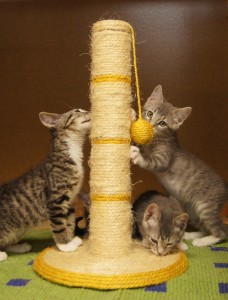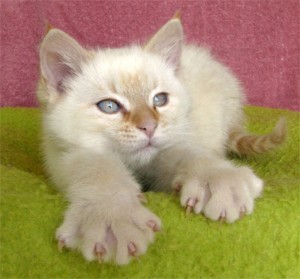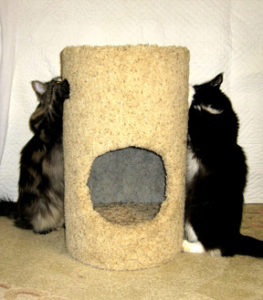How to help your cat scratch where you want
Cats come with claws. It’s what Nature intended for them, so they can hunt, stretch, climb and communicate to other cats.

Scratching is a basic cat instinct, like eating or purring. Not only does it feel good and keep a cat’s muscles in shape, but it’s a necessary way of communication. There are ways to channel scratching behavior so it works for you and your cats.
Cats have scent glands in their paw pads that let them leave pheromones on the scratcher. This allows them to leave invisible messages for other cats without escalating into aggression. It’s especially important in a multi-cat household to have scratchers available.
The trick to making sure your cat uses its scratcher instead of the furniture is to make the scratcher more valuable to your cat than your furniture is. It’s best to start good habits immediately after getting your cat.
Cats have preferences for scratchers, so you’ll need to find out what your cat likes. Fortunately, scratchers come in many variations. Vertical scratchers offer surfaces such as carpet or sisal and come in different sizes from huge fancy trees to small posts. Horizontal scratchers are usually made of fiberboard edges and can be flat, curved or wedge shaped. You can also tip over a small post to use horizontally.
Some cats will use either but some prefer one over the other. If you don’t already know your cat’s preference, purchase or borrow at least one vertical scratcher and note the surface. If your cat likes catnip, rub the leaves on the scratching surface and watch to see if the cat uses it. When the cat stops, praise it and offer a treat. (Don’t offer the treat while the cat is scratching or you’ll stop the scratching.) A few positive experiences like this will help your cat to prefer the scratcher.
If your cat doesn’t scratch vertically, tip the scratcher over and see if it prefers to scratch horizontally. If it doesn’t scratch either way, it probably prefers a different surface. Note which surfaces you’ve tried and try a different one. We’ve never met a cat who didn’t like to scratch on either carpet, sisal, rope or wood.
Once you see which surface the cat prefers, you can set up more scratchers in the house. We’ve found that one scratcher per cat is usually adequate, but having additional ones increases the odds your cat will use them rather than the furniture.
 Because you are a part of your cat’s colony, you can make the scratcher even more valuable by leaving your own scent on it. Simply rub the scratcher occasionally as you go by. This will reinforce the scratcher as an acceptable place for your cat to leave his or her scent by scratching.
Because you are a part of your cat’s colony, you can make the scratcher even more valuable by leaving your own scent on it. Simply rub the scratcher occasionally as you go by. This will reinforce the scratcher as an acceptable place for your cat to leave his or her scent by scratching.
Unless your cat is very small, the short posts sold in many stores will not work well. If the post tips over on the cat while it’s scratching, it can make the cat fear the post. Most normal cats will need a scratcher nearly as high as the highest they can stretch. It’s also important to make sure the base is stable enough to take the weight of your cat pushing on it without tipping.
A high cat tree has the advantage of providing additional territory for one or more cats. Plus, it’s a natural behavior for cats to be high and safe where they can observe everything. This can be especially valuable if you have other animals that the cat my want to get away from. For example, your cat may appreciate being able to get out of dog reach.
Place the scratchers in areas where the cat will use them. If they are off in a corner where you or your cat don’t go, your cat will probably ignore them. Putting a scratcher in the same area as a litter box is a good idea too, since one will reinforce the other in the cat’s communication system.
Scratchers can be inexpensive to make. You can use scrap carpet or sisal rope and a staple gun to cover your own post. Just make sure the staples are securely embedded in the surface and make sure the bottom is heavy enough not to tip over.

This scratcher was made from a heavy fiberboard cylinder made to form concrete called a Sonotube. We cast concrete in the bottom, cut out the side hole and used a piece of plywood for the top, then covered it all with carpet scraps, total cost less than $20.00. You can contact us for more info on how to do it yourself.
If you have vertical surfaces that aren’t precious to you, stapling a little carpet to an area can work well and be less obtrusive. We added some carpet to an old table leg in the laundry room that our cats use all the time.
Putting a scratcher in the same area as a litter box is a good idea too, since one will reinforce the other in the cat’s communication system.
If you wish to use claw caps on your cat, please use them as a temporary training tool. They will make scratching unpleasant, so they can make your furniture unappealing. When the caps are about to wear off, introduce a sturdy new scratcher, with a surface your cat likes, in a place the cat will use it. Your cat will then easily transition to the new scratcher and forget about the furniture.
This method helps you avoid the expense and trauma of constant claw caps, since they can disrupt the cat’s natural stretching and communication abilities. Besides, if you have the patience and time to apply a claw cap, you can put your time and energy into training, making it much more fun for both you and your cat.
You can trim your cat’s claws to remove the sharp tip if they are getting caught on the carpet or to reduce the risk during play. You may only need to trim the front claws. Visit us at Happy Cats and we will show you how.
Happy Cats Haven does not recommend or support declawing. You can read more about the process and reasons for not doing it in our article, Declawing: before you take away their claws.





